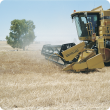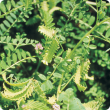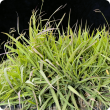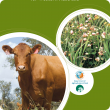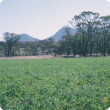Pasture species
The Department of Primary Industries and Regional Development is a world leader in the development of new pasture legumes and provides information and advice to assist farmers in making appropriate species and cultivar decisions.
The choice of pasture species is important to maximise the productivity and profitability of Western Australian farms. A wide range of grasses and legumes are available for rain-fed and irrigated production systems. Legume species in particular are valued for their high quality feeding value and ability to improve soil fertility through nitrogen fixation. The selection of which pasture species to grow is based on climate, soil conditions and feed demand as determined by the type of livestock and cropping system you have.
Pastures in the south-west of Western Australia are typically dominated by annual species, particularly annual ryegrass and subterranean clover, with a range of alternative legume species such as serradella and biserrula now developed for specific niches. In some situations perennial pastures (plants that live for more than two years) such as lucerne, warm season grasses and fodder shrubs can improve production, protect natural resources and build the capacity of farming systems to adapt to future production and environmental challenges.
Filter by search
Filter by topic
- (-) Remove Pasture management filter Pasture management
- Pasture establishment (4) Apply Pasture establishment filter
- Livestock research & development (2) Apply Livestock research & development filter
- Livestock species (2) Apply Livestock species filter
- Livestock & animals (2) Apply Livestock & animals filter
- Livestock management (2) Apply Livestock management filter
- Beef cattle (2) Apply Beef cattle filter
- Irrigated crops (1) Apply Irrigated crops filter



